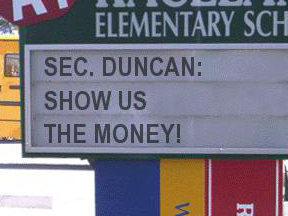By Bill Turque
Washington Post
September 30, 2011
There was certainly nothing energizing about the venue–a windowless, stifling basement room beneath the MLK Library. But this was where the 13 members of the new D.C. Public Education Finance Reform Commission met Tuesday evening to begin their complex and politically fraught mission: sorting out questions of equity and fairness around the $1 billion that taxpayers spend annually on schools.
“In some ways these issues are very concrete and objective. I also understand that discussion about the use of limited budget resources are impassioned discussions,” said commission chairman Ed Lazere, executive director of the D.C. Fiscal Policy Institute.
It didn’t take long for those passions to surface on Tuesday. During the public comment period Ramona Edelin, veteran civil rights activist and executive director of the D.C. Association of Chartered Public Schools, said there was a moral imperative to the funding issue.
“Many of us come out of a long history of separate and unequal,” and inequitably funded charters must not be part of that tradition, she said.
The charter community, which pushed hard for the D.C. Council’s creation of the commission last year, has long contended that their publicly-funded, independently operated schools–which serve about 40 percent of the city’s 75,000 public school students–are treated unfairly in the budget process.
By late November, the commission is required to submit an “Equity Report” that lays out where and how DCPS and the public charters get money and in-kind services–and recommendations for addressing inequities. The group’s findings are expected to inform decision-making on the FY13 budget.
By multiple measures, the District has among the most generous charter funding laws in the country. A 2010 survey by the pro-charter Center for Education Reform ranks D.C. as the nation’s most legally and fiscally hospitable environment for charters–ahead of all











 District superintendents around the country – who will be the first port of call for the education stimulus funds – seem to want more than what is already a pretty substantial influx of money.
District superintendents around the country – who will be the first port of call for the education stimulus funds – seem to want more than what is already a pretty substantial influx of money.
